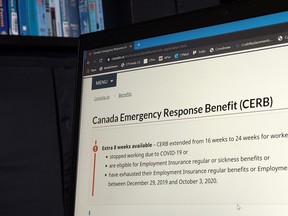
OTTAWA — Canada’s auditor general says COVID-19 benefits were delivered quickly and helped mitigate economic suffering, however, the federal government hasn’t done enough to recover overpayments.
In a new report Tuesday, Karen Hogan said federal benefit programs provided relief to workers and employers affected by the pandemic and helped the national economy rebound.
As the Canadian national soccer teams head to their respective FIFA World Cups, Derek Van Diest is on the scene to cover all the action. Expect expert insights and analysis in your inbox daily throughout the tournaments, and weekly on Thursdays for the rest of the season.
Thanks for signing up!
A welcome email is on its way. If you don't see it, please check your junk folder.
The next issue of Corner Kicks with Derek Van Diest will soon be in your inbox.
“Overall, we found that the Canada Revenue Agency and Employment and Social Development Canada effectively delivered COVID-19 programs,” Hogan said in a news conference.
At the same time, the auditor general said the revenue agency and the department have not followed up by verifying those payments.
Hogan estimates $4.6 billion was paid to people who were not eligible, while another $27.4 billion in payments to individuals and businesses should be further investigated.
“Billions of dollars have gone, or may have gone, to ineligible recipients,” Hogan said.
RECOMMENDED VIDEO
The audit found that efforts to recover overpayments have been limited, with the Canada Revenue Agency collecting $2.3 billion through voluntary repayments.
Pre-payment controls were also lacking, though the report said the government made some changes to those controls for individual benefits.
However, the CRA made few changes to improve controls for businesses to mitigate risks of overpayment.
Hogan also flagged that there was a lack of sufficient data to assess the effectiveness of the Canada Emergency Wage Subsidy program.
Although the subsidy did go to businesses in industries hardest hit by the pandemic, the report said the effect of the subsidy on business resilience is unclear because the agency collected limited data from businesses.
Federal cabinet ministers responded to the auditor general’s report in a news conference on Tuesday afternoon.
“The individual supports and programs in question achieved their goals of getting money into the hands of Canadians quickly,” said Employment Minister Carla Qualtrough.
When asked whether she regrets not adjusting the wage subsidy program to ensure only eligible businesses received payments, Qualtrough said, “I have no regrets.”
Miles Corak, an economics professor at City University of New York, said the auditor’s report shows a discrepancy between how benefits were administered for workers and their employers.
“The government was essentially working in the dark in administrating the Canada Emergency Wage (Subsidy),” Corak said.
The auditor general has made a set of recommendations to improve the collection of overpayments and to fix data gaps relating to businesses.
Government organizations reviewed in the audit say they have accepted the recommendations, but only partially accepted a recommendation related to recuperating overpayments.
The federal government said it would prioritize which to pursue by weighing the resources necessary with the amount owed.
“It would not be cost effective nor in keeping with international and industry best practices to pursue 100 per cent of all potentially ineligible claims,” the response said.


